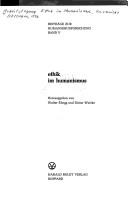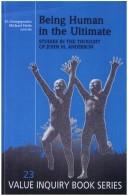| Listing 1 - 10 of 24 | << page >> |
Sort by
|
Book
Year: 2019 Publisher: Milano, Italy : Ledizioni,
Abstract | Keywords | Export | Availability | Bookmark
 Loading...
Loading...Choose an application
- Reference Manager
- EndNote
- RefWorks (Direct export to RefWorks)
Gli undici saggi che compongono il volume costituiscono un omaggio che gli Autori hanno voluto tributare, in occasione del centocinquantenario della nascita, a Federico Patetta (Cairo Montenotte, 16.2.1867 – Alessandria, 28.10.1945), un maestro emblematico per la Storia del diritto italiano e, più in generale, per le discipline genericamente definite ‘umanistiche’, il quale ha illustrato con il proprio magistero l’Ateneo torinese nei primi decenni del secolo XX. Le tre parti in cui si articola il libro tentano di restituire un profilo complesso del personaggio che in certo qual modo rifletta la poliedricità di formazione, di interessi e di magistero che hanno contraddistinto lo studioso nel vivace e complesso panorama culturale della prima metà del Novecento. La costante attenzione all’indissolubile e imprescindibile legame tra ricerca e insegnamento universitario, la raffinata erudizione negli ambiti più eterogenei delle ‘scienze umane’, la costante vocazione di filologo e critico, esercitata su un prezioso e vasto patrimonio librario e manoscritto a noi tramandato, emergono – nei contributi qui raccolti – quali cifra e testamento spirituale di uno degli ultimi ‘umanisti’ della contemporaneità che parrebbe ancora aver molto da insegnare sull’urgenza e imprescindibilità del recupero della storia delle fonti, giuridiche ma anche letterarie, filosofiche, teologiche, tardo-antiche e altomedievali, per la sopravvivenza della preziosa eredità culturale e civile dell’Occidente.
Book
ISBN: 9789042934290 9042934298 Year: 2018 Publisher: Leuven ; Paris ; Bristol, CT Peeters
Abstract | Keywords | Export | Availability | Bookmark
 Loading...
Loading...Choose an application
- Reference Manager
- EndNote
- RefWorks (Direct export to RefWorks)

ISBN: 3518291602 Year: 2002 Publisher: Frankfurt am Main Suhrkamp
Abstract | Keywords | Export | Availability | Bookmark
 Loading...
Loading...Choose an application
- Reference Manager
- EndNote
- RefWorks (Direct export to RefWorks)
Democracy --- Humanistic ethics --- Solidarity

ISBN: 3764617438 Year: 1979 Publisher: Boppard am Rhein Boldt
Abstract | Keywords | Export | Availability | Bookmark
 Loading...
Loading...Choose an application
- Reference Manager
- EndNote
- RefWorks (Direct export to RefWorks)
Book
ISBN: 0879751185 0879751177 Year: 1980 Publisher: Buffalo Prometheus
Abstract | Keywords | Export | Availability | Bookmark
 Loading...
Loading...Choose an application
- Reference Manager
- EndNote
- RefWorks (Direct export to RefWorks)
Humanistic ethics --- Morale humaniste --- Ethics.

ISBN: 9789004463721 9789051838374 Year: 1995 Publisher: Leiden; Boston : BRILL
Abstract | Keywords | Export | Availability | Bookmark
 Loading...
Loading...Choose an application
- Reference Manager
- EndNote
- RefWorks (Direct export to RefWorks)
For John M. Anderson philosophy, as the love of wisdom, is a concern for what is ultimate. The essays in this volume take to heart this understanding of philosophy, and are therefore responses to the ultimate. The first four essays by Kaelin, Schrag, Baillif and Johnstone, deal with Anderson's own account of ultimacy as it is presented in his reflections on the aesthetic occasion, the experience of the sublime, on freedom and on insight. The concern for what is ultimate is formulated differently by each of the other eight essays. Desmond articulates ways of our encounter with the ultimate by means of what he calls essential perplexity. Gendlin reflects on Aristotle's characterization of thinking as an activity that is ultimate. Biemel and Lingis present death as an aspect of the ultimate. Hersch sees our loss of meaning and value as the result of our refusal of finitude and thus of our denial of the ultimate which reveals itself in this finitude. Ginsberg initiates us into the ultimacy of the human encounter that is dialogue. Verene speaks of the ultimate through his account of the fool. For Kockelmans philosophy, unlike science, deals with what-is as it manifests itself in our encounter with our lived world which is a source of meaning, and in that sense an ultimate. Finally, John M. Anderson writes of the awareness of our becoming more than we are, and does so by bespeaking the origin of the dialogue we are.
Bibliography --- Congress --- Humanistic ethics --- Infinite --- Philosophical anthropology
Book
ISBN: 1299412726 365302126X Year: 2012 Publisher: Frankfurt am Main : Peter Lang,
Abstract | Keywords | Export | Availability | Bookmark
 Loading...
Loading...Choose an application
- Reference Manager
- EndNote
- RefWorks (Direct export to RefWorks)
In recent years, calls for a new humanism have arisen from a variety of voices across the spectrum of philosophy, expressing frustration with outdated models of the human that cannot account for the richness of our social being. The postmodern deconstruction of the human now requires a reconstructive moment. In response, the author articulates a new and explicitly posthumanist humanism using the framework developed by Jean-Paul Sartre in his later Marxist-Existentialist works. Sartre's unique dialectical and hermeneutical methods allow us to reconceptualize the human beyond traditional dichotomies of individual/social and freedom/necessity. The author argues that the individual and the social should be understood as existing within a dynamic, co-constituting interrelation, and that individual autonomy is not at odds with, but rather fundamentally enabled by, the social.
Humanism. --- Humanistic ethics. --- Sartre, Jean-Paul, --- Ethics.
Periodical
ISSN: 21541639 Year: 1998 Publisher: Charlottesville, VA : Philosophy Documentation Center
Abstract | Keywords | Export | Availability | Bookmark
 Loading...
Loading...Choose an application
- Reference Manager
- EndNote
- RefWorks (Direct export to RefWorks)
Secular humanism --- Humanistic ethics --- Humanisme laïque --- Morale humaniste
Book
ISBN: 9519264310 Year: 1997 Publisher: Helsinki Societas philosophica Fennica
Abstract | Keywords | Export | Availability | Bookmark
 Loading...
Loading...Choose an application
- Reference Manager
- EndNote
- RefWorks (Direct export to RefWorks)
Humanistic ethics. --- Liberalism --- Moral and ethical aspects. --- Humanistic ethics --- Humanist ethics --- Moral and ethical aspects --- Ethics --- Humanism
Book
ISSN: 03448142 ISBN: 9783110225761 311022576X Year: 2010 Volume: 95 Publisher: Berlin de Gruyter
Abstract | Keywords | Export | Availability | Bookmark
 Loading...
Loading...Choose an application
- Reference Manager
- EndNote
- RefWorks (Direct export to RefWorks)
Humanistic ethics --- Humanism --- Ethics --- History. --- Philosophy --- Classical education --- Classical philology --- Philosophical anthropology --- Renaissance --- Deontology --- Ethics, Primitive --- Ethology --- Moral philosophy --- Morality --- Morals --- Philosophy, Moral --- Science, Moral --- Values --- Humanist ethics --- History --- Humanistic ethics - History. --- Humanism - Italy - History. --- Ethics - Italy - History.
| Listing 1 - 10 of 24 | << page >> |
Sort by
|

 Search
Search Feedback
Feedback About UniCat
About UniCat  Help
Help News
News